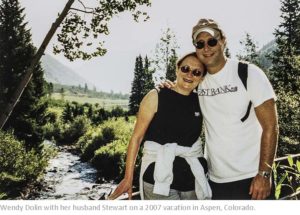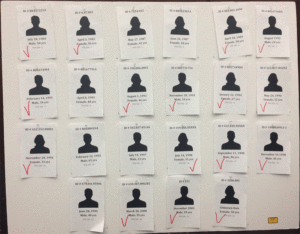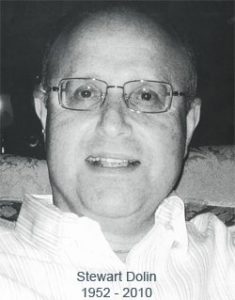How a Chicago jury got it right
On April 20, a federal jury in Chicago awarded $3 million to the widow of a man who threw himself in front of a downtown subway train seven years ago. Stewart Dolin’s suicide, they concluded, was not the result of depression, anxiety or the stresses of his job as a corporate lawyer. Rather, it was his medication that had led to his death: a generic version of paroxetine or Paxil, the blockbuster antidepressant made by GlaxoSmithKline (GSK).
Paxil is one of a class of antidepressant drugs known as selective serotonin reuptake inhibitors or SSRI’s. These have become some of the most commonly prescribed drugs in America and worldwide, offered to treat a wide range of emotional ills from grief to social anxiety. But while many people find them helpful, they have long been known to make some patients irritable and anxious.
In extreme cases, this can advance to a state known as akathisia – an intense emotional turmoil and physical restlessness that can be so unbearable as to trigger suicide in those who suffer from it. That’s what Wendy Dolin, Stewart’s wife, insisted had happened to her husband. After listening to the evidence for six weeks, the jury agreed.
They also agreed that GSK had known all about the risks of akathisia and suicide posed by Paxil, but had failed to warn prescribers. As Dolin lawyer Michael Baum put it: “GSK has known for two decades that Paxil can cause people of all ages to commit suicide … GSK not only hid the risk, but stuck its head in the sand and ignored countless suicides that occurred in its clinical trials.”
Generic drugs and the Catch-22
Wendy Dolin’s victory also challenges an enormous Catch-22 in the current state of the law. A 2011 decision of the U.S. Supreme Court had barred consumers from suing the manufacturer of any generic drug for failure to warn of its hazards. That’s because by law, the generic pill must not only contain the same ingredients as the brand-name version, it must also carry the same warning label issued by the drug’s original brand-name developer. Yet because they do not produce the generic tablets, GSK and other drug companies have insisted they can’t be liable for any harm done on account of a false or misleading label.
However, in 2014 the Chicago court ruled that this would leave patients without any legal protection, and allowed Wendy Dolin to pursue a case against GSK. The entire pharmaceutical industry will be keenly interested in GSK’s appeal.
What happened to Stu Dolin?
At 57, Stu Dolin had been a corporate lawyer for over thirty years. He was a senior partner in the multinational firm of Reed Smith, earning about a million a year. He and Wendy had been together since their senior year in high school and were still inseparable; their two adult children were both doing well and were close to their father. Stu Dolin worked hard but also loved travel, sports and hanging out with his family and a circle of close friends. He seemed anything but depressed.

At 57, Dolin was also not supposed to be at risk for problems related to Paxil. In 2004, the FDA had imposed a Black Box warning label on Paxil and other SSRIs, alerting doctors to a risk of suicide in children and teens. The warning was later applied to all antidepressants and extended to patients up to age 24. However, based on the evidence submitted by GSK and other drug manufacturers, no warning was issued for adults.
In the summer of 2010 Stu Dolin began seeing a counselor for anxiety linked to job stress. He had sought help for similar problems once or twice before. Two years into the Great Recession, there was plenty of stress to go around in Chicago’s financial district. However, a fellow Reed Smith partner and longtime friend testified that Dolin’s anxiety was nothing all that out of the ordinary. His counselor worked with him on relaxation and problem-solving techniques; she did not see him as a man at risk of suicide.
His family doctor, another old friend, prescribed Paxil. Dr. Sachmann didn’t think Stu needed to see a psychiatrist; it was a garden-variety case of stress. However, within two days of beginning the Paxil, those who knew Stu Dolin saw unsettling changes. His moods swung from happy and confident one moment, to agitated or weepy the next. His wife Wendy recalled that he didn’t seem like himself. For the first time, he asked his counselor for an emergency session; she was concerned enough to call him the next morning and urge him to ask Dr. Sachmann for some tranquilizers to calm him down. That same day, after a business lunch, he walked down to the Blue Line subway station where a fellow passenger noticed him pacing back and forth in an agitated manner. When the train arrived, he threw himself in front of it.
The Dolin jury and the March for Science
If Paxil really posed that kind of danger, argued GSK attorney Andrew Bayman, why hadn’t anyone spoken out? His implication was clear: This was an established drug, a staple of modern medicine. Surely it must have been vetted by reputable scientific experts. If the jury couldn’t see that, perhaps they were just blind to the science.
Two days after the verdict, on Earth Day, 40,000 people rallied in downtown Chicago against what they saw as attacks on science itself by the new team in Washington: dismissing global warming as a Chinese hoax, blaming autism on the measles-mumps-rubella vaccine, and taking aim at public science budgets from the EPA to the National Institutes of Health. Clearly, nothing might garner more sympathy for GSK than to paint itself as another victim of “anti-science hysteria.”
More than a few Americans, long urged to blame the nation’s woes on other people’s frivolous lawsuits, might buy that claim. “Sorry for the woman’s loss but this is truly an example of when juries go bad,” commented one Chicago Tribune reader. “We all suffer with giant health premiums and drug costs because of ignorant juries and greedy lawyers,” another wrote. “Wonder why he was so depressed?”
They might be surprised to learn that the jury’s verdict was based less on the speeches of hyperventilating trial lawyers than on a six-week immersion in the science of clinical trials, antidepressants, statistical significance and drug regulation. If anything, the jurors’ efforts could have earned them a place on the podium at the March for Science.
They heard Dr. David Ross, a former senior regulatory scientist with the Food and Drug Administration (FDA) testify that “GSK was not upfront” with FDA reviewers about Paxil’s suicide risks. Dr. Ross explained that the FDA does not test new drugs on its own, but relies on studies conducted by the companies themselves: “We only know what we are shown.” GSK’s analysis of its own clinical trials pointed to 8.9 times the rate of suicidal behavior in depressed patients on Paxil compared to those taking a placebo. However, Dr. Ross testified, the company had misrepresented the results so that the increased odds of suicidal acts on Paxil appeared to be just 1.8, which reassured FDA that the difference was not significant.
They heard Dr. David Healy, an expert on the SSRI class of drugs from the UK, explain that psychiatry had known for fifty years that antidepressants could cause agitation and suicide in some patients. SSRIs carried higher risks than older drugs, with violent suicidal acts being noticeably more frequent. Based on his own experience conducting clinical trials, Healy showed jurors the methods GSK had used to conceal the suicide risk — in particular, inflating the number of suicides and suicide attempts in trial subjects taking placebos, which made Paxil look safer by comparison than it actually was. He also explained how clearly suicidal behavior could be coded under misleading terms such as “emotional lability.”
They heard Dr. Joseph Glenmullen, a clinical psychiatry professor at Harvard Medical School who reviewed Dolin’s treatment records, testify that his original anxiety symptoms were quite different from the drug-induced akathisia he had shown in the days before his suicide. Glenmullen testified that he was 100% certain that Paxil, not job stress, had caused Dolin’s suicide — but the drug’s labeling would have led his doctor to believe that this could not occur in a middle-aged man.
GSK’s own experts may have sealed its fate
 Certainly GSK was not cheated of its own opportunity to bring on the science. Yet time and again its own employees and retained experts were forced to concede the Dolin team’s main points. Dr. Anthony Rothschild, a purported expert in “psychological autopsies,” was unable to convince jurors that Stu Dolin’s suicide was due to his underlying mental illness. He did, however, inform them that he had testified for GSK in about 20-30 prior Paxil death cases — he had lost count of the exact number.
Certainly GSK was not cheated of its own opportunity to bring on the science. Yet time and again its own employees and retained experts were forced to concede the Dolin team’s main points. Dr. Anthony Rothschild, a purported expert in “psychological autopsies,” was unable to convince jurors that Stu Dolin’s suicide was due to his underlying mental illness. He did, however, inform them that he had testified for GSK in about 20-30 prior Paxil death cases — he had lost count of the exact number.
Dr. John Kraus, a senior GSK scientist, and Dr. Geoffrey Dunbar, its former CEO, both admitted that the company’s misclassifying of “placebo suicides” had made its Paxil safety data misleading. Yet both men had published the data in medical journals which had never been corrected, along with submitting it to the FDA. Finally, faced with the twenty known and two possible suicides on Paxil during clinical trials, Dr. Kraus reluctantly conceded that 80% of the victims were over thirty. Whatever they had told the FDA, the risks of Paxil could not be confined to adolescents — and GSK knew it.
What happened to Stu Dolin, attorney David Rapaport told the jury, could have happened to anyone. The tragedy was that it could have been prevented, if Dolin and his doctor had been told of the potential risks. After six weeks of testimony, the jury was convinced: The science should have mandated a warning.
Where will Wendy Dolin’s victory lead?
Four years ago the Dolin family founded MISS-D: the Medication-Induced Suicide Foundation in Memory of Stewart Dolin. They plan to step up the great educational work they’ve already begun to make sure that other families don’t suffer the same fate. “None of us here are anti-drug. That’s not the issue,” she told the press. “But we are patient advocates and we hope that people will start asking better questions.”
For David Healy, the time has come for the FDA and other regulators to consider changing that label to extend the suicide warning to adults: “If it’s that clear to the average man on the street, and the FDA doesn’t do something about it, we have an odd situation.” Considering that as many as one in five American adults may take these drugs, “odd” is putting it mildly.
















Great summary of the issues and the testimony! This is REALLY big news!
Report comment
Johanna
Excellent blog; well written and to the point. This is valuable ammunition that we all can use to further expose the many crimes of Biological Psychiatry.
Richard
Report comment
Question: if Paxil “hides” 20 +2 suicides from clinical trials, has anyone ever tried to sum up what total amount of suicides has occured during clinical trials of all SSRI’s?
Perhaps other lawsuits has uncovered suicides for the other brands????
Ove2017
Report comment